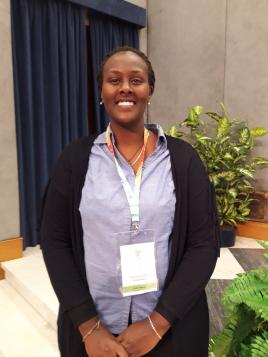
Mar 23, 2018 | Non categorizzato
 “I saw in the Pope, enthusiasm in listening. He asked us to speak up with courage, with no filters, freely, and this is what we do. The Church is at our disposal, and we are certain that the Synod in October will bear many fruits.” Stella Nishimwe comes from Burundi, is a member of the Focolare Movement, and represents her country in the pre-Synodal assembly. “I was struck by what Pope Francis said yesterday. He’s a special person who lives with the people of God and really knows the reality of the world. Together with the population he wishes to seek solutions, starting from the aspects of life. From the Synod, I expect a new path of the Church with the youth will arise, where the young people will feel the common responsibility in the progress of the Church.” Nishimwe then spoke of the conditions of the young people in her country: “They live in poverty, in the uncertainty of the future, with an elevated unemployment. With this Synod I see a Church that listens, walks with us, shares the difficulties which the youth undergo in different countries, under contexts of war, poverty and unemployment. These situations will be difficult to change, but at least we can try together and in so doing experience what it means to be a Church, a sole family.” Fonte: SIR https://www.agensir.it/quotidiano/2018/3/20/pre-sinodo-giovani-nishimwe-burundi-ho-visto-nel-papa-lentusiasmo-dellascolto/
“I saw in the Pope, enthusiasm in listening. He asked us to speak up with courage, with no filters, freely, and this is what we do. The Church is at our disposal, and we are certain that the Synod in October will bear many fruits.” Stella Nishimwe comes from Burundi, is a member of the Focolare Movement, and represents her country in the pre-Synodal assembly. “I was struck by what Pope Francis said yesterday. He’s a special person who lives with the people of God and really knows the reality of the world. Together with the population he wishes to seek solutions, starting from the aspects of life. From the Synod, I expect a new path of the Church with the youth will arise, where the young people will feel the common responsibility in the progress of the Church.” Nishimwe then spoke of the conditions of the young people in her country: “They live in poverty, in the uncertainty of the future, with an elevated unemployment. With this Synod I see a Church that listens, walks with us, shares the difficulties which the youth undergo in different countries, under contexts of war, poverty and unemployment. These situations will be difficult to change, but at least we can try together and in so doing experience what it means to be a Church, a sole family.” Fonte: SIR https://www.agensir.it/quotidiano/2018/3/20/pre-sinodo-giovani-nishimwe-burundi-ho-visto-nel-papa-lentusiasmo-dellascolto/
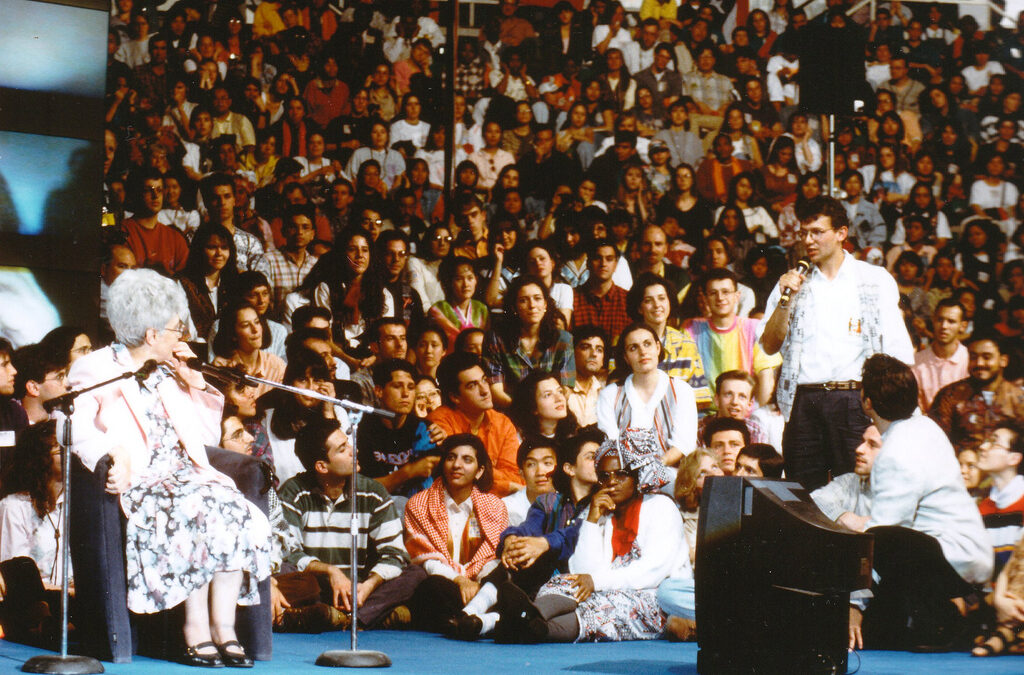
Mar 23, 2018 | Focolare Worldwide
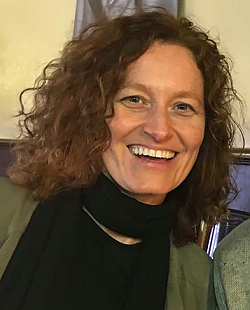
Michelle Sopala
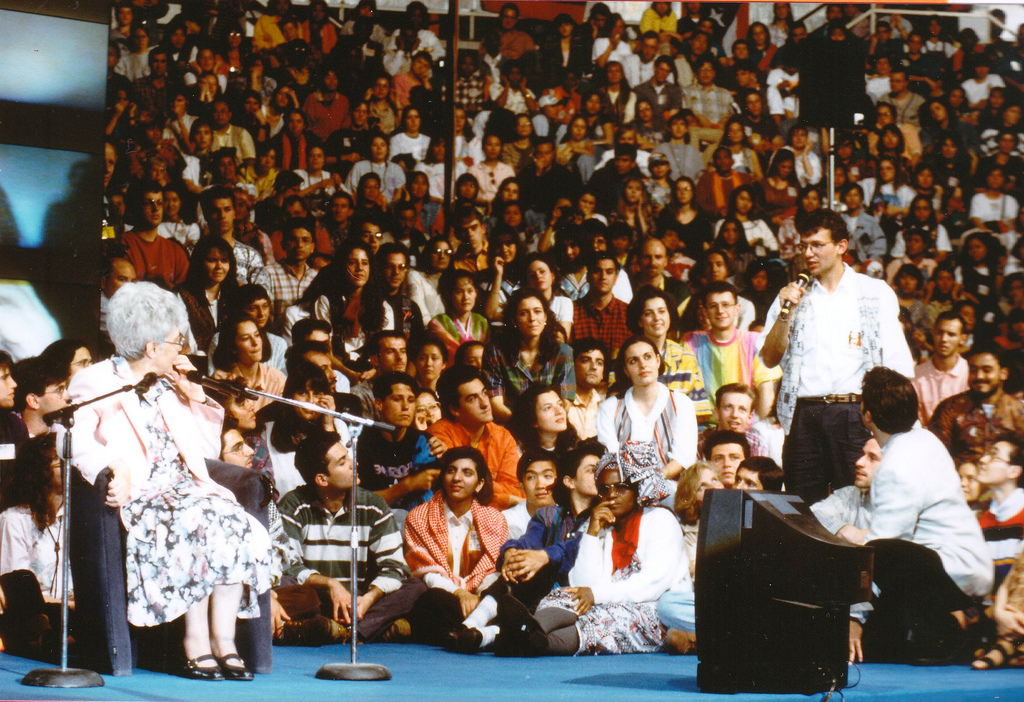 And now for the Genfest, itself! Even though it was a life-changing event in all its aspects, I can’t hide it: for me the highlight was the meeting with Chiara. I don’t know if the other 12 thousand young people in the arena felt the same, but I felt like Chiara was talking to me, and me alone. When Noel asked her the final question, «Chiara, from the bottom of your heart, what would you like to say to us young people?», her answer rang out like a war-call that still rings in my ears. With a super-astute intuition and understanding of what the young heart yearns for, she quoted St. Catherine who had told her disciples not to be satisfied with small things because “God wants them big!”. «You, young people – she said, with a conviction that went straight to the heart – don’t be satisfied with crumbs… with small joys… but aim high and seek the fullness of joy: that joy that comes from living out unity!» Hmm. For better or for worse, that’s been my experience ever since. “Unity”? A deep word that I’m still discovering after these 23 years. But that “fullness of joy”? Yep! I’ve found it! Oh! …and by the way, our performance was chosen. Take a look. Hope you like it! Michelle Sopala
And now for the Genfest, itself! Even though it was a life-changing event in all its aspects, I can’t hide it: for me the highlight was the meeting with Chiara. I don’t know if the other 12 thousand young people in the arena felt the same, but I felt like Chiara was talking to me, and me alone. When Noel asked her the final question, «Chiara, from the bottom of your heart, what would you like to say to us young people?», her answer rang out like a war-call that still rings in my ears. With a super-astute intuition and understanding of what the young heart yearns for, she quoted St. Catherine who had told her disciples not to be satisfied with small things because “God wants them big!”. «You, young people – she said, with a conviction that went straight to the heart – don’t be satisfied with crumbs… with small joys… but aim high and seek the fullness of joy: that joy that comes from living out unity!» Hmm. For better or for worse, that’s been my experience ever since. “Unity”? A deep word that I’m still discovering after these 23 years. But that “fullness of joy”? Yep! I’ve found it! Oh! …and by the way, our performance was chosen. Take a look. Hope you like it! Michelle Sopala
https://youtu.be/LX6rNkyGjoE
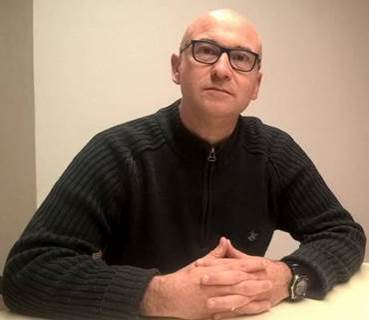
Mar 22, 2018 | Non categorizzato

Jonathan Michelon
https://twitter.com/twitter/statuses/976421224095076352
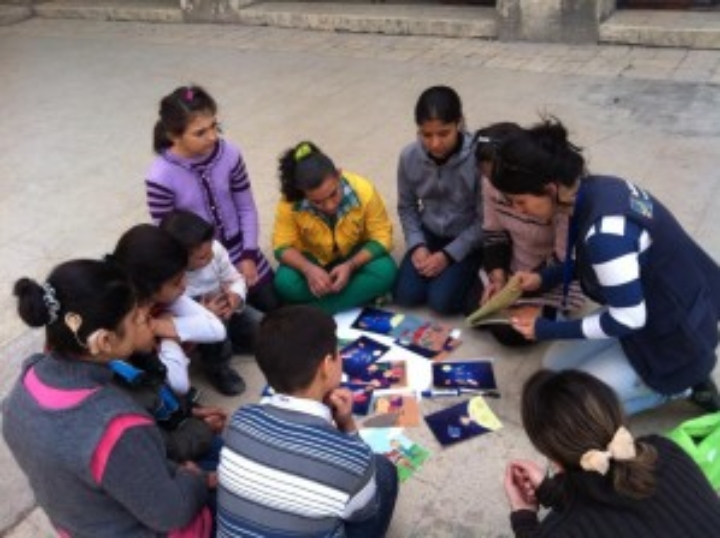
Mar 22, 2018 | Focolare Worldwide
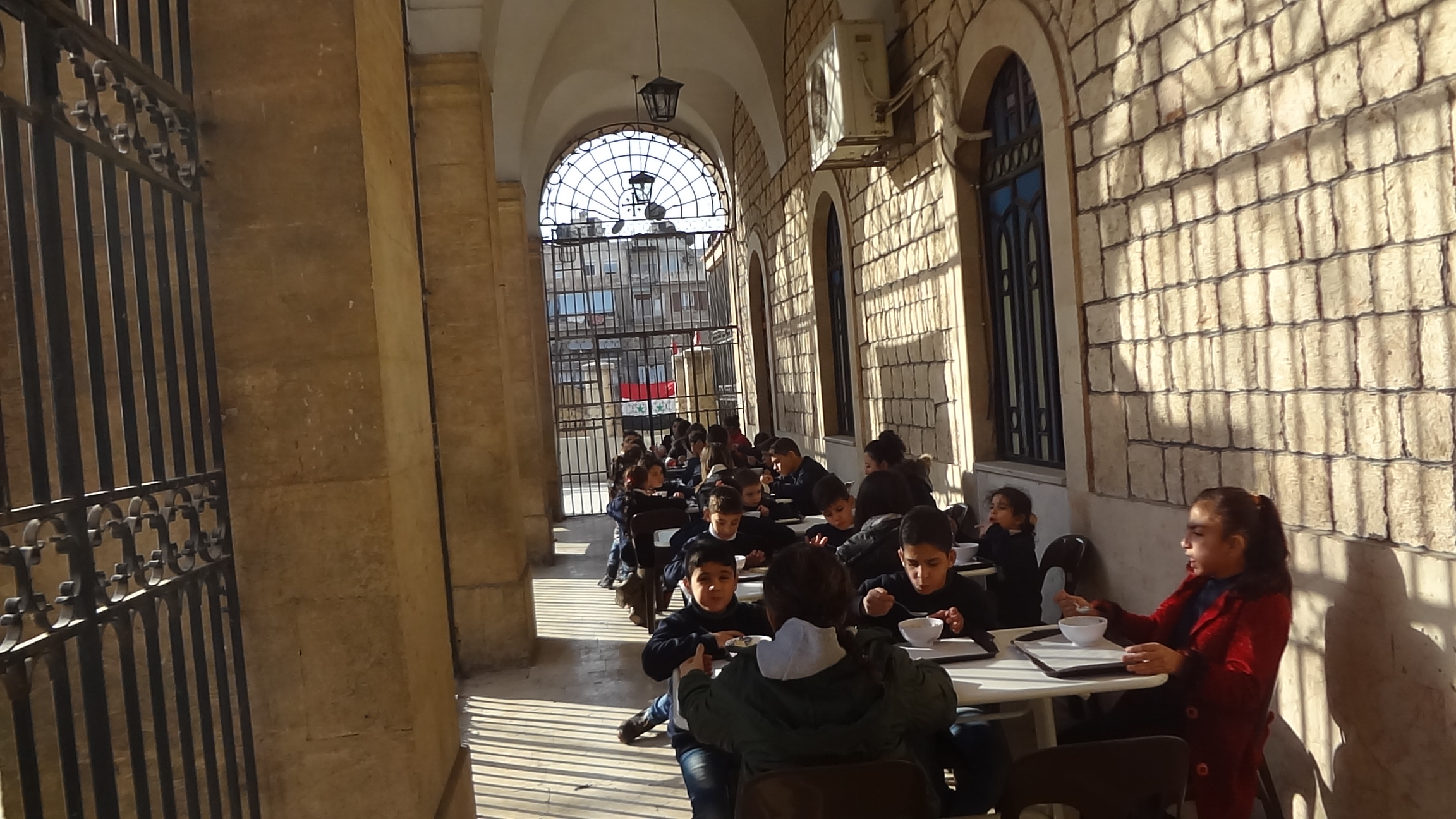 The story of Jean and Vivian is a story of love, hope and courage. They met in Aleppo, Syria, in 2000 while belonging to the Focolare Movement. Vivian is a widow with a one year-old son who is totally deaf. Jean is a carpenter and socially active. Their common commitment to living the Gospel and bringing the ideal of a united world to humanity brought them closer and, in 2003 they got married and have four children. Vivian’s first son, Marc, was the motivation behind their adventure. Because of his need for special care, Vivian went to Lebanon where Marc would later follow and stay at a centre run by the Focolare: “It’s really a foretaste of Heaven,” he says. “Living the Gospel in daily life accompanies the whole educational process. The children grow up in this oasis of peace and develop their talents while overcoming their handicap. The dream began to grow in me of setting up an institute myself, in my own city of Aleppo.” Jean supported him in his venture and, in 2005, their small centre was begun. Other larger ones would follow with larger capacity for up to ten children, all from poor families who couldn’t afford the cost. The centre was always in deficit: “Whenever we needed something,” Jean recalls, “we’d go in front of the crucifix and hand over our needs to Him. Providence arrived right on time every time.”
The story of Jean and Vivian is a story of love, hope and courage. They met in Aleppo, Syria, in 2000 while belonging to the Focolare Movement. Vivian is a widow with a one year-old son who is totally deaf. Jean is a carpenter and socially active. Their common commitment to living the Gospel and bringing the ideal of a united world to humanity brought them closer and, in 2003 they got married and have four children. Vivian’s first son, Marc, was the motivation behind their adventure. Because of his need for special care, Vivian went to Lebanon where Marc would later follow and stay at a centre run by the Focolare: “It’s really a foretaste of Heaven,” he says. “Living the Gospel in daily life accompanies the whole educational process. The children grow up in this oasis of peace and develop their talents while overcoming their handicap. The dream began to grow in me of setting up an institute myself, in my own city of Aleppo.” Jean supported him in his venture and, in 2005, their small centre was begun. Other larger ones would follow with larger capacity for up to ten children, all from poor families who couldn’t afford the cost. The centre was always in deficit: “Whenever we needed something,” Jean recalls, “we’d go in front of the crucifix and hand over our needs to Him. Providence arrived right on time every time.”  The breakout of the war in 2011 brought much death and destruction. Jean lost his carpentry, the centre wasn’t having any financial input and many were living on help from the Church and humanitarian organizations. Many left the country and, even though Jean and Vivian were tormented at the thought, they bought tickets to go. But one thing became clearer and clearer in their hearts: they couldn’t leave “their” deaf children and destroy that dream that had come true with so much effort. “On the night before our departure, I stepped into church,” Jeans says, “I had a deep conversation with Jesus, face to face, man to man. He seemed to speak in my heart and asked me not to go: what would the children now? I felt him posing this tragic question to me. I put my children in His hands. I went home and Vivian and I decided to rip up the tickets and stay in the city forever to be a help to the people who needed us.” “We were hopeful that God would accompany and support us in all our future projects and especially in our family,” echoed Vivian, “and that’s what happened.” Now the centre is their second home, their children also take part in the life of the group and Jean works full time “This community has widened our hearts. There is no longer boy or girl, student or teacher, healthy or handicapped, Muslim or Christian. We live in the one love and beneath the same gaze of a God-Love, incarnate, living in our midst.”
The breakout of the war in 2011 brought much death and destruction. Jean lost his carpentry, the centre wasn’t having any financial input and many were living on help from the Church and humanitarian organizations. Many left the country and, even though Jean and Vivian were tormented at the thought, they bought tickets to go. But one thing became clearer and clearer in their hearts: they couldn’t leave “their” deaf children and destroy that dream that had come true with so much effort. “On the night before our departure, I stepped into church,” Jeans says, “I had a deep conversation with Jesus, face to face, man to man. He seemed to speak in my heart and asked me not to go: what would the children now? I felt him posing this tragic question to me. I put my children in His hands. I went home and Vivian and I decided to rip up the tickets and stay in the city forever to be a help to the people who needed us.” “We were hopeful that God would accompany and support us in all our future projects and especially in our family,” echoed Vivian, “and that’s what happened.” Now the centre is their second home, their children also take part in the life of the group and Jean works full time “This community has widened our hearts. There is no longer boy or girl, student or teacher, healthy or handicapped, Muslim or Christian. We live in the one love and beneath the same gaze of a God-Love, incarnate, living in our midst.”
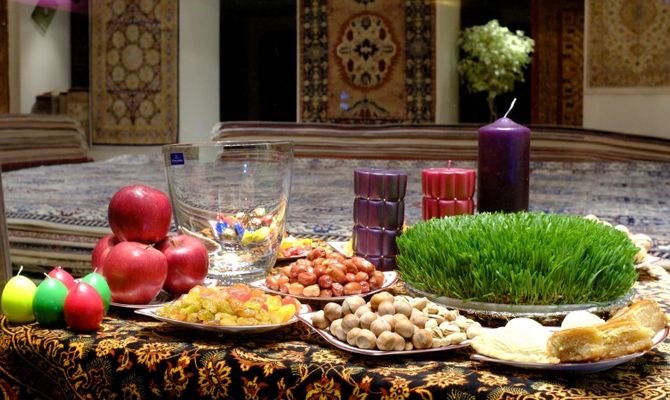
Mar 21, 2018 | Non categorizzato
 The celebration of the Persian New Year coincides with the vernal equinox which marks the beginning of spring, on 21 March, day in which many countries of Asia and Eastern Europe celebrate the feast of Nawroz (literally “new day”) proclaimed the international day of the United Nations which in 2009 was officially registered as an Intangible Cultural Heritage of humanity. Nawroz is an ancient, happy and joyous feast, estimated to be celebrated by 300 million people. Connected to the idea of the rebirth of nature, it is pervaded by a rich symbolism and promotes values of peace, reconciliation, solidarity between generations, friendship among families, peoples and communities.
The celebration of the Persian New Year coincides with the vernal equinox which marks the beginning of spring, on 21 March, day in which many countries of Asia and Eastern Europe celebrate the feast of Nawroz (literally “new day”) proclaimed the international day of the United Nations which in 2009 was officially registered as an Intangible Cultural Heritage of humanity. Nawroz is an ancient, happy and joyous feast, estimated to be celebrated by 300 million people. Connected to the idea of the rebirth of nature, it is pervaded by a rich symbolism and promotes values of peace, reconciliation, solidarity between generations, friendship among families, peoples and communities.
Mar 21, 2018 | Non categorizzato
Could it be that there are still prejudices based on the colour of the skin despite the great achievements of the last century? Many steps have been taken, but work needs to be done to completely eliminate all forms of inequality. On 21 March, the International Day for the Elimination of Racial Discrimination, established in 1966 by the United Nations, reminds us of the massacre in Sharpeville, South Africa, which occurred on 21 March 1960. On that day, perhaps the bloodiest in apartheid history, the police opened fire on a crowd of black citizens protesting against a measure of racial segregation which was imposed on them. About 70 of them remained lifeless on the ground. In these days, campaigns in support of integration and against all forms of discrimination, hatred and violence perpetrated for racial reasons are organized in various parts of the world. The protagonists of these initiatives, as always, are the young people.
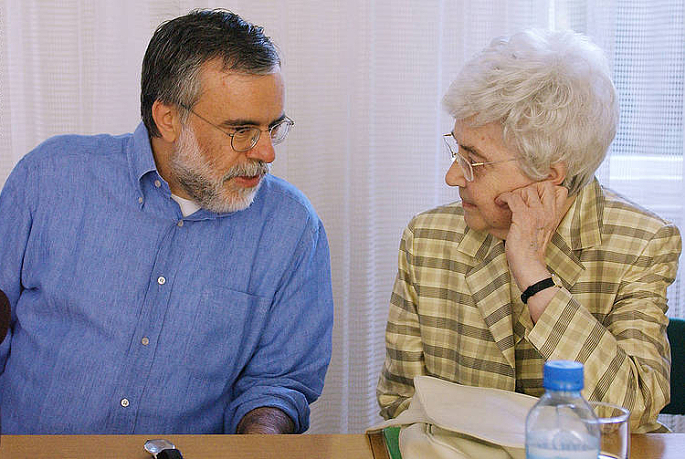
Mar 21, 2018 | Focolare Worldwide
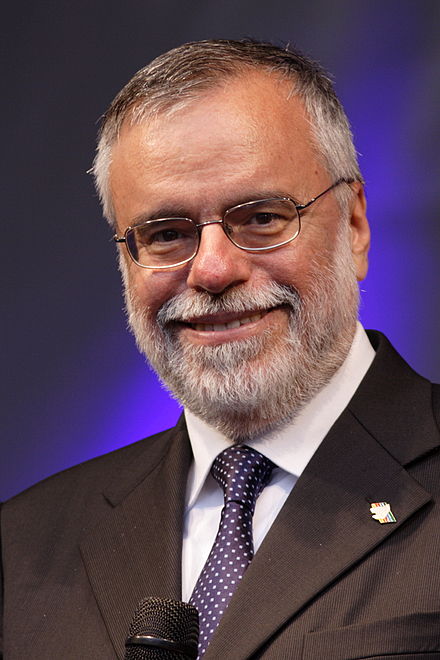 We meet Andrea Riccardi, founder of the Community of Sant’Egidio, at Castel Gandolfo, not far from the Mariapolis Center there. It feels like a holiday, since hundreds of people (in the end they will count close to 2,000) are flowing toward an event on the occasion of the 10th anniversary of Chiara Lubich’s passing. Outside the door of the small hall where we meet, there are many festive voices. “Ten years later, as we return to Chiara Lubich, it is not a return to the past, like archeology,” says Riccardi. “It’s not even a sentimental memory, as people can have for someone who was important in the Church. “But,” he confides, “It is certainly something important in my life.” He mentions the pivotal years in Europe, when democracy was returning after a century-long interruption, when the walls and iron curtains were being dismantled. “I think that Chiara’s message is even more relevant today than it was during the Cold War or in 1989. Today, in this global world, her message speaks of the common destiny of all of us, of the unity of peoples and the human family. Yet it is not a sociologist’s typical message, but a profound one, given that Chiara was a woman who was able to summarize as well as go into depth, to analyze and communicate simply. “Today we need a message of unity, because this global world is not united spiritually. Patriarch Athenagoras, a great friend of Chiara, said, ‘The world is unifying, but there is no spiritual unity.’ “And Chiara tells us that this world can be united, rich with poor, those nearby with those far away, those native to a place with those who have just arrived. Chiara also tells us,” Riccardi adds, “that we, mere men and women, the young and the elderly, that you too, can change the world.
We meet Andrea Riccardi, founder of the Community of Sant’Egidio, at Castel Gandolfo, not far from the Mariapolis Center there. It feels like a holiday, since hundreds of people (in the end they will count close to 2,000) are flowing toward an event on the occasion of the 10th anniversary of Chiara Lubich’s passing. Outside the door of the small hall where we meet, there are many festive voices. “Ten years later, as we return to Chiara Lubich, it is not a return to the past, like archeology,” says Riccardi. “It’s not even a sentimental memory, as people can have for someone who was important in the Church. “But,” he confides, “It is certainly something important in my life.” He mentions the pivotal years in Europe, when democracy was returning after a century-long interruption, when the walls and iron curtains were being dismantled. “I think that Chiara’s message is even more relevant today than it was during the Cold War or in 1989. Today, in this global world, her message speaks of the common destiny of all of us, of the unity of peoples and the human family. Yet it is not a sociologist’s typical message, but a profound one, given that Chiara was a woman who was able to summarize as well as go into depth, to analyze and communicate simply. “Today we need a message of unity, because this global world is not united spiritually. Patriarch Athenagoras, a great friend of Chiara, said, ‘The world is unifying, but there is no spiritual unity.’ “And Chiara tells us that this world can be united, rich with poor, those nearby with those far away, those native to a place with those who have just arrived. Chiara also tells us,” Riccardi adds, “that we, mere men and women, the young and the elderly, that you too, can change the world.  “Chiara was a friend to great people and appreciated by great people. I think of her friendship with John Paul II, who called her his ‘peer, his equal in age.’ But Chiara also showed that the world can change through the least of us who has faith. Like Mary with the Magnificat. “She helped me to understand the value of a charism, because Chiara recognized in me, in the Community of Sant’Egidio, a charism. She had a deep sense of people and experiences of Church.” Riccardi concludes: “For me Chiara is also a very dear memory of a profound friendship. She was a friend, a friend in the small things, in the attention she gave when she invited you to her table, in the phone calls, in taking care of you. “She was also someone who saw accurately in important moments for the Church. I think of, for example, of when John Paul II met with ecclesial movements. Chiara said, ‘This was a flash of inspiration from the Pope, a point of arrival that must also become a new point of departure.’ “Today my affection is accompanied with prayerful thoughts with Chiara, for Chiara.”
“Chiara was a friend to great people and appreciated by great people. I think of her friendship with John Paul II, who called her his ‘peer, his equal in age.’ But Chiara also showed that the world can change through the least of us who has faith. Like Mary with the Magnificat. “She helped me to understand the value of a charism, because Chiara recognized in me, in the Community of Sant’Egidio, a charism. She had a deep sense of people and experiences of Church.” Riccardi concludes: “For me Chiara is also a very dear memory of a profound friendship. She was a friend, a friend in the small things, in the attention she gave when she invited you to her table, in the phone calls, in taking care of you. “She was also someone who saw accurately in important moments for the Church. I think of, for example, of when John Paul II met with ecclesial movements. Chiara said, ‘This was a flash of inspiration from the Pope, a point of arrival that must also become a new point of departure.’ “Today my affection is accompanied with prayerful thoughts with Chiara, for Chiara.”
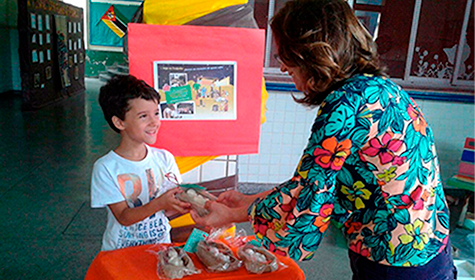
Mar 20, 2018 | Non categorizzato
 A letter of thanks was sent to the gen4 worldwide, with the publication of the balance statement of the initiative “They’ve dislodged Jesus,” undertaken each year by the children of the Focolare Movement during the Christmas season. Last Christmas, thanks to the offers gathered by the sales of the chalk statues of “babes” portraying Baby Jesus, the gen4 with the support of the adults and in some cases also of local institutions, collected 3,627.60 euro that were allocated to eight projects in Brazil, Mexico, Colombia, Venezuela, Peru, Argentina, Burundi, Uganda and Syria. In addition to this, a donation was allocated to medical care, foodstuffs and schooling material for four projects in the Central African Republic, Cameroon, Egypt and Iraq. What comes to the fore, beyond the figures, is the “culture of giving” from which the gen4 draw inspiration.
A letter of thanks was sent to the gen4 worldwide, with the publication of the balance statement of the initiative “They’ve dislodged Jesus,” undertaken each year by the children of the Focolare Movement during the Christmas season. Last Christmas, thanks to the offers gathered by the sales of the chalk statues of “babes” portraying Baby Jesus, the gen4 with the support of the adults and in some cases also of local institutions, collected 3,627.60 euro that were allocated to eight projects in Brazil, Mexico, Colombia, Venezuela, Peru, Argentina, Burundi, Uganda and Syria. In addition to this, a donation was allocated to medical care, foodstuffs and schooling material for four projects in the Central African Republic, Cameroon, Egypt and Iraq. What comes to the fore, beyond the figures, is the “culture of giving” from which the gen4 draw inspiration.
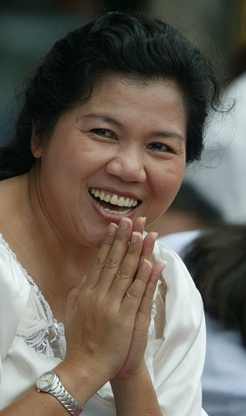
Mar 20, 2018 | Non categorizzato

Foto: Pixabay
Mar 19, 2018 | Focolare Worldwide

 “I saw in the Pope, enthusiasm in listening. He asked us to speak up with courage, with no filters, freely, and this is what we do. The Church is at our disposal, and we are certain that the Synod in October will bear many fruits.” Stella Nishimwe comes from Burundi, is a member of the Focolare Movement, and represents her country in the pre-Synodal assembly. “I was struck by what Pope Francis said yesterday. He’s a special person who lives with the people of God and really knows the reality of the world. Together with the population he wishes to seek solutions, starting from the aspects of life. From the Synod, I expect a new path of the Church with the youth will arise, where the young people will feel the common responsibility in the progress of the Church.” Nishimwe then spoke of the conditions of the young people in her country: “They live in poverty, in the uncertainty of the future, with an elevated unemployment. With this Synod I see a Church that listens, walks with us, shares the difficulties which the youth undergo in different countries, under contexts of war, poverty and unemployment. These situations will be difficult to change, but at least we can try together and in so doing experience what it means to be a Church, a sole family.” Fonte: SIR https://www.agensir.it/quotidiano/2018/3/20/pre-sinodo-giovani-nishimwe-burundi-ho-visto-nel-papa-lentusiasmo-dellascolto/
“I saw in the Pope, enthusiasm in listening. He asked us to speak up with courage, with no filters, freely, and this is what we do. The Church is at our disposal, and we are certain that the Synod in October will bear many fruits.” Stella Nishimwe comes from Burundi, is a member of the Focolare Movement, and represents her country in the pre-Synodal assembly. “I was struck by what Pope Francis said yesterday. He’s a special person who lives with the people of God and really knows the reality of the world. Together with the population he wishes to seek solutions, starting from the aspects of life. From the Synod, I expect a new path of the Church with the youth will arise, where the young people will feel the common responsibility in the progress of the Church.” Nishimwe then spoke of the conditions of the young people in her country: “They live in poverty, in the uncertainty of the future, with an elevated unemployment. With this Synod I see a Church that listens, walks with us, shares the difficulties which the youth undergo in different countries, under contexts of war, poverty and unemployment. These situations will be difficult to change, but at least we can try together and in so doing experience what it means to be a Church, a sole family.” Fonte: SIR https://www.agensir.it/quotidiano/2018/3/20/pre-sinodo-giovani-nishimwe-burundi-ho-visto-nel-papa-lentusiasmo-dellascolto/










